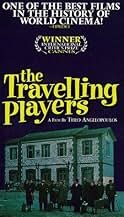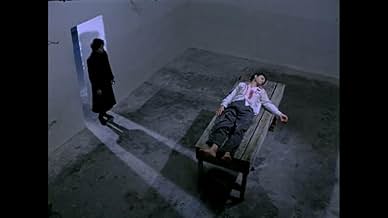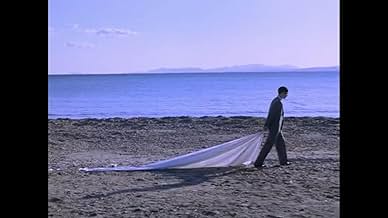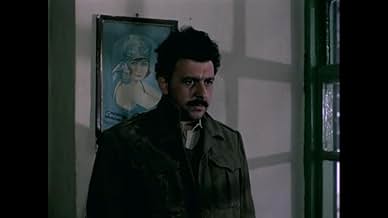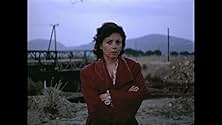NOTE IMDb
7,8/10
4,6 k
MA NOTE
Ajouter une intrigue dans votre langueGreece, 1939-1952: Fascist, Nazi, and Communist conflict, as seen through the eyes of a family of travelling provincial players.Greece, 1939-1952: Fascist, Nazi, and Communist conflict, as seen through the eyes of a family of travelling provincial players.Greece, 1939-1952: Fascist, Nazi, and Communist conflict, as seen through the eyes of a family of travelling provincial players.
- Réalisation
- Scénario
- Casting principal
- Récompenses
- 12 victoires et 2 nominations au total
Avis à la une
A flawed masterpiece from Angelopoulos, the first of a number of great films of his you can pick at if you want.
First and foremost, it is a technical achievement; almost 4 hours and only about 80 cuts! It goes against all we've gotten used to in film story-telling, and does it brilliantly.
The story follows a troupe of actors back and forth through the years 1939 to 1952. They're thrown about by the violent, sometimes absurd tides of Greek history, with victory over the Nazi's giving way to the rise of local fascists at home.
The film is very Brechtian and distanced in style. We hardly get to know the characters at all, despite the running time. It's much more interested in the great tides of politics and time than individuals - which is both its strength and its weakness. I was always interested, sometimes horrified, but rarely touched emotionally. Also, some of the good/bad of the politics felt simplistic.
That said, despite its length, I will re-watch it. I suspect I'll appreciate the amazing scope of it's vision and the bravery of it's style even more without expecting to get caught up in the people in a conventional way.
If you have the chance, get ahold of the 'New Star' DVD, which was only in release a short time. The transfer was supervised and approved by Angelopoulos, and certainly looks wildly better than the commonly found VHS tape.
First and foremost, it is a technical achievement; almost 4 hours and only about 80 cuts! It goes against all we've gotten used to in film story-telling, and does it brilliantly.
The story follows a troupe of actors back and forth through the years 1939 to 1952. They're thrown about by the violent, sometimes absurd tides of Greek history, with victory over the Nazi's giving way to the rise of local fascists at home.
The film is very Brechtian and distanced in style. We hardly get to know the characters at all, despite the running time. It's much more interested in the great tides of politics and time than individuals - which is both its strength and its weakness. I was always interested, sometimes horrified, but rarely touched emotionally. Also, some of the good/bad of the politics felt simplistic.
That said, despite its length, I will re-watch it. I suspect I'll appreciate the amazing scope of it's vision and the bravery of it's style even more without expecting to get caught up in the people in a conventional way.
If you have the chance, get ahold of the 'New Star' DVD, which was only in release a short time. The transfer was supervised and approved by Angelopoulos, and certainly looks wildly better than the commonly found VHS tape.
10iathanas
The Travelling Players is possibly the greatest movie in the history of Greek cinema. It is directed by the world-renowned Greek director Theo Angelopoulos and it presents the life in Greece from 1939 to 1952 through a family of travelling provincial players. It explores the political history of Greece during a very dramatic period, that includes dictatorship, the WWII outbreak, the Italian invasion and the subsequent German occupation and it continues with the liberation of the country and the very bloody Civil War.
The Travelling Players was a very controversial movie. The film was to participate officially in the Cannes Film Festival, but the conservative Greek government, sought (and failed) to prevent this to happen, because the film tells the modern Greek history through a left- Marxist perspective.
Angelopoulos proves that he's a master filmmaker on every level. From direction and writing to every technical aspect. Cinematography in particular.
Also, the music by Loukianos Kilaidonis is fantastic and elevates the film in a different level.
The Travelling Players is a masterpiece that everyone should watch.
The Travelling Players was a very controversial movie. The film was to participate officially in the Cannes Film Festival, but the conservative Greek government, sought (and failed) to prevent this to happen, because the film tells the modern Greek history through a left- Marxist perspective.
Angelopoulos proves that he's a master filmmaker on every level. From direction and writing to every technical aspect. Cinematography in particular.
Also, the music by Loukianos Kilaidonis is fantastic and elevates the film in a different level.
The Travelling Players is a masterpiece that everyone should watch.
This is my second time watching this film and it's just as great as I remember it being. In regards to Angelopoulous, the only other film I've seen from him is "Landscape in the Mist", which I also really enjoyed, but I like this one much more. "Landscape in the Mist" is definitely the more accessible of the two films since it has a greater emphasis on characterization, but while I enjoyed that film quite a bit, I prefer this film for its greater focus on its mysterious charm.
I stopped caring about the story and the characters about half an hour into this film and instead focused on the film's style. Angelopoulos seamlessly blends personal and political history in a number of hypnotic ways in just about every single sequence. And this is accomplished despite the film being almost four hours long! Throughout all the long takes in the film, Angelopoulos managed to drop my jaw a number of times. For one, he found all kinds of creative ways for the various political figures and set pieces to creep into the frame and intrude on or interrupt the characters lives. For example, the film sometimes showed the sounds of a patrol of Nazis or a political march in the distance get louder and louder until the characters eventually entered the frame. Also, sometimes when the characters would exit from the frame of a shot, it would linger in that location for a while until a soldier or a military vehicle would enter the frame, often indicating the film is jumping from past to present. This unconventional shooting style gave a hypnotic style to the film which I found quite mesmerizing and poetic.
The way violence is shown in this film is also impressive, specifically in regards to which bits are shown onscreen and which are shown offscreen. A recurring aspect to the violence was that, right when a violent bit would start, the characters would run away from the frame and the sounds of gunfire, explosions, or screaming could be heard in the distance, creating a strong sense of claustrophobia and (at times) fear of the unknown in the process. In many other cases, the violence served to prevent the actors from performing time and time again. The main highlight to the violence though is a lengthy sequence in the middle where the actors come across a gunfight between a patrol of Nazis and a group of Communists while sneaking through a town at night. The way the violence and the military units in this sequence are framed (they're only shown through the gaps between various houses and stores), in addition to a dose of surrealism, is nothing short of perfect.
Really, this film kept me glued to the screen from beginning to end in a way that few films have accomplished, and that it accomplishes this in spite of its length makes me all the more impressed by it. Some people may take issue with its lack of characterization, but I didn't mind that at all since it contributed to the film's mysterious power. Of course, I understand that many people will be intimidated by this film's length (which is understandable as I was worried it would be a chore to get through when I first watched it), but I still recommend giving it a chance anyways.
I stopped caring about the story and the characters about half an hour into this film and instead focused on the film's style. Angelopoulos seamlessly blends personal and political history in a number of hypnotic ways in just about every single sequence. And this is accomplished despite the film being almost four hours long! Throughout all the long takes in the film, Angelopoulos managed to drop my jaw a number of times. For one, he found all kinds of creative ways for the various political figures and set pieces to creep into the frame and intrude on or interrupt the characters lives. For example, the film sometimes showed the sounds of a patrol of Nazis or a political march in the distance get louder and louder until the characters eventually entered the frame. Also, sometimes when the characters would exit from the frame of a shot, it would linger in that location for a while until a soldier or a military vehicle would enter the frame, often indicating the film is jumping from past to present. This unconventional shooting style gave a hypnotic style to the film which I found quite mesmerizing and poetic.
The way violence is shown in this film is also impressive, specifically in regards to which bits are shown onscreen and which are shown offscreen. A recurring aspect to the violence was that, right when a violent bit would start, the characters would run away from the frame and the sounds of gunfire, explosions, or screaming could be heard in the distance, creating a strong sense of claustrophobia and (at times) fear of the unknown in the process. In many other cases, the violence served to prevent the actors from performing time and time again. The main highlight to the violence though is a lengthy sequence in the middle where the actors come across a gunfight between a patrol of Nazis and a group of Communists while sneaking through a town at night. The way the violence and the military units in this sequence are framed (they're only shown through the gaps between various houses and stores), in addition to a dose of surrealism, is nothing short of perfect.
Really, this film kept me glued to the screen from beginning to end in a way that few films have accomplished, and that it accomplishes this in spite of its length makes me all the more impressed by it. Some people may take issue with its lack of characterization, but I didn't mind that at all since it contributed to the film's mysterious power. Of course, I understand that many people will be intimidated by this film's length (which is understandable as I was worried it would be a chore to get through when I first watched it), but I still recommend giving it a chance anyways.
O Thiasos is one of those cerebral and omphaloskeptic movies that just do not happen anymore, shamelessly demanding from the viewer to attune to its eccentric pace. Space and time become pawns in the director's hands, who in effect accomplishes their operatic tranquility in contrast to the static directorial style. In rejecting all conventions of academic narrativity it sustains its formulaic enigma throughout its considerable length, persistently (and obsessively) questioning the freedom of man in a world domineered by irreversible occurrences. Boosted equally by grandeur, mystifying symbolism and pictorial lyricism the film comes to its redeeming conclusion. Enchanting, liberating, revolutionary, focused and precise. Both coldly objective and passionately subjective. A rare masterpiece.
10kaljic
We watch movies to forget the true banality of life. Movies are packed with witty, non-stop dialogue, head-spinning action which takes place in a short period of time, and, of course, beautiful, drop-dead gorgeous women. We are so conditioned by contemporary movies, we forget or want to forget ordinarily life.
The Traveling Players by Angelopoulos has none of this. The dialogue is ordinary, spoken by ordinary people, by ordinary men and women. When they speak it is not rapid-fire, non-stop delivery, but ordinary speech most times separated by long periods of silence.
The beauty of The Traveling Players - or any film by Angelopoulos - the ordinary is beautiful. The sweeping, long scenes in this movie are stunning. We quickly identify with one or more of the traveling players. In the dialogue we can hear words spoken by a close friend or acquaintance. When the film ends nearly four hours later, you will want to see more.
This movie should not be missed.
The Traveling Players by Angelopoulos has none of this. The dialogue is ordinary, spoken by ordinary people, by ordinary men and women. When they speak it is not rapid-fire, non-stop delivery, but ordinary speech most times separated by long periods of silence.
The beauty of The Traveling Players - or any film by Angelopoulos - the ordinary is beautiful. The sweeping, long scenes in this movie are stunning. We quickly identify with one or more of the traveling players. In the dialogue we can hear words spoken by a close friend or acquaintance. When the film ends nearly four hours later, you will want to see more.
This movie should not be missed.
Le saviez-vous
- AnecdotesThe whole film is accomplished in around 80 shots.
- Citations
Elektra's Father: [before he is executed by the Germans] I came cross the sea, from Ionia. Where did you come from?
Meilleurs choix
Connectez-vous pour évaluer et suivre la liste de favoris afin de recevoir des recommandations personnalisées
- How long is The Travelling Players?Alimenté par Alexa
Détails
Contribuer à cette page
Suggérer une modification ou ajouter du contenu manquant

Lacune principale
By what name was Le Voyage des comédiens (1975) officially released in India in English?
Répondre

